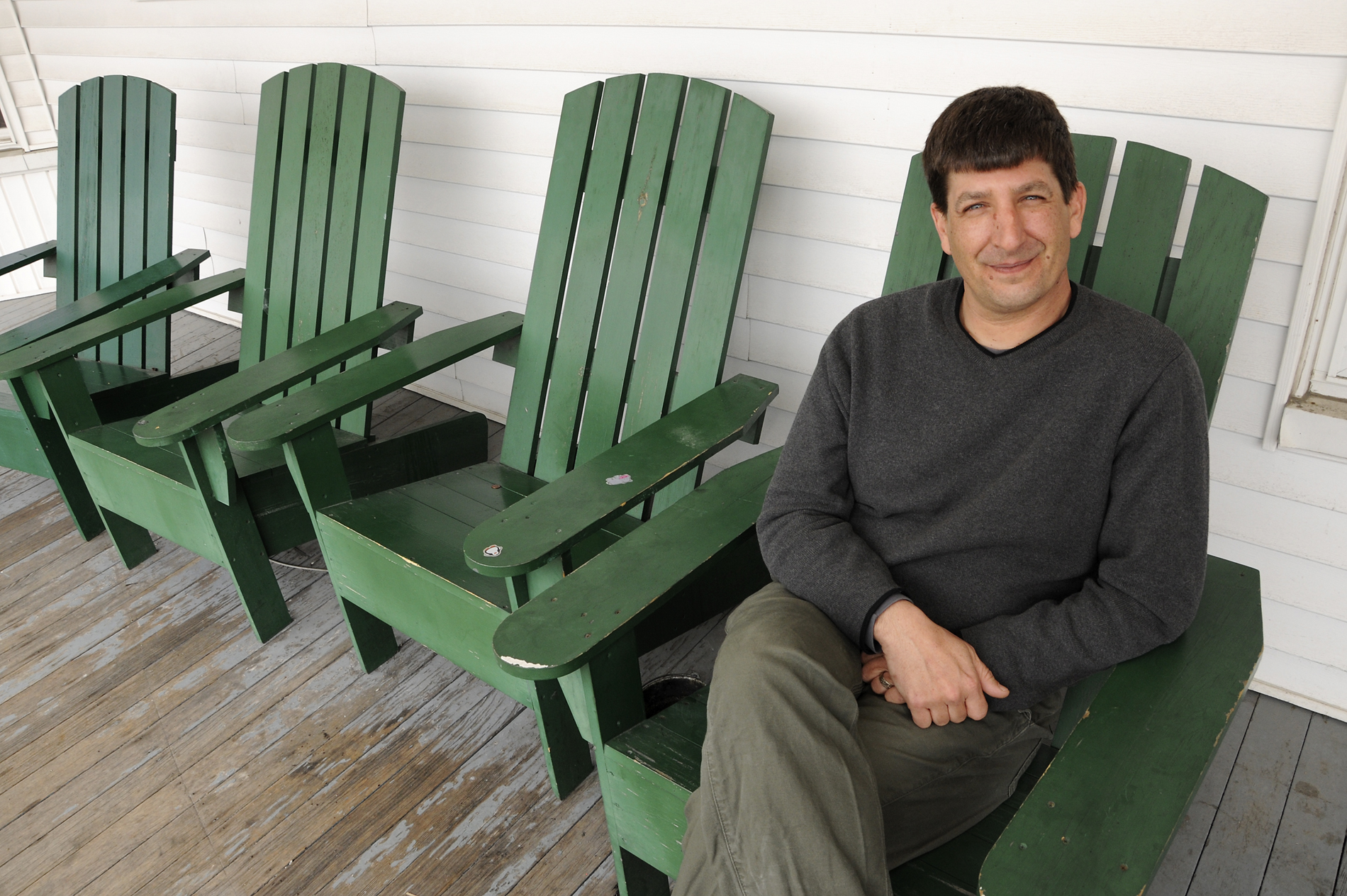
Professor Brian Eisenhauer on the porch of EcoHouse, home to the Office of Environmental Sustainability and a living and learning laboratory for students to practice living sustainably. Jon Gilbert Fox photo.
In his roles as professor, scholar, researcher, mentor, and campus leader, Brian Eisenhauer is at the center of Plymouth State’s sustainability and climate neutrality efforts. Under his leadership, Plymouth State has been consistently recognized as a leader in environmental sustainability and is regularly included in The Princeton Review’s Guide to Green Colleges, a compilation of the most environmentally responsible higher education institutions in the United States and Canada.
In recognition of his work in inspiring students to care for their world, Eisenhauer was recently named the first recipient of the Helen Abbott ’39 Professorship in Environmental Studies. The Abbott Professorship supports the University’s commitment to environmental sustainability and education, and will enable Eisenhauer to further develop his “green” efforts, grassroots activism, environmental communications, and program evaluation.
Plymouth Magazine asked Eisenhauer: What are the greatest challenges in your work with the environment and how can we all make a genuine impact on the planet?
Combatting Apathy
My work on sustainability and achieving carbon neutrality on campus addresses a critical issue for the world today: global warming and its impacts. My most important goal is to help people make conscious, informed decisions. As an educator I’m working to challenge the widely accepted cultural norms and asking people to think before they act.
This is closely connected to my major concern about the environment today, people’s apathy. Environmental change is generally something that occurs over time, and it’s a challenge to focus people’s attentions on these issues given our culture of electronic entertainment and communication. The more we can do to encourage outdoor recreation and other ways of fostering people’s understanding of their relationship to, and dependence on, the environment, the closer we will be to addressing the apathy that prevents most people from taking even simple steps to improve that relationship.
Moving Toward a Carbon-Neutral Campus
In my role at Plymouth State, I spend a lot of time working on campus sustainability issues. The number of efforts at PSU with sustainability dimensions is testimony to the importance Plymouth State places on the issue. One of our goals to this end is to be carbon neutral in campus operations by 2050. To achieve this, we’re evaluating new fuel sources—including renewable energy sources—to convert the campus infrastructure. We’re always working with students, faculty, and staff to improve our campus community’s relationship with the environment. This year, we created a new edition of our campus sustainability guide, a handbook for being more sustainable while working and living on campus. We also developed two sustainability audits: a residential audit so students can evaluate their practices at home and get support for making improvements; and the PSU Green Offices Program, an audit of office practices.
Sustainability Starts at Home
For me the most important rule of sustainable living is to live simply: by reducing our consumption levels and our use of natural resources, we lessen our environmental impact. We also have less complexity and debt, and more happiness in our lives. I’m a big believer in the joys of simplicity. I’m always looking for ways to reduce my environmental impact and to be more involved with my community. Some simple ideas I follow are avoiding the use of disposable goods (use cloth instead of paper napkins, etc.), lowering my energy consumption through conservation in behavior and through maintaining and renovating my home, volunteering in the community, walking and carpooling when I can, and overall, making conscious, not automatic choices.
If we all make even small contributions, change will happen.
Tags: Brian Eisenhauer Faculty Forum green sustainability













